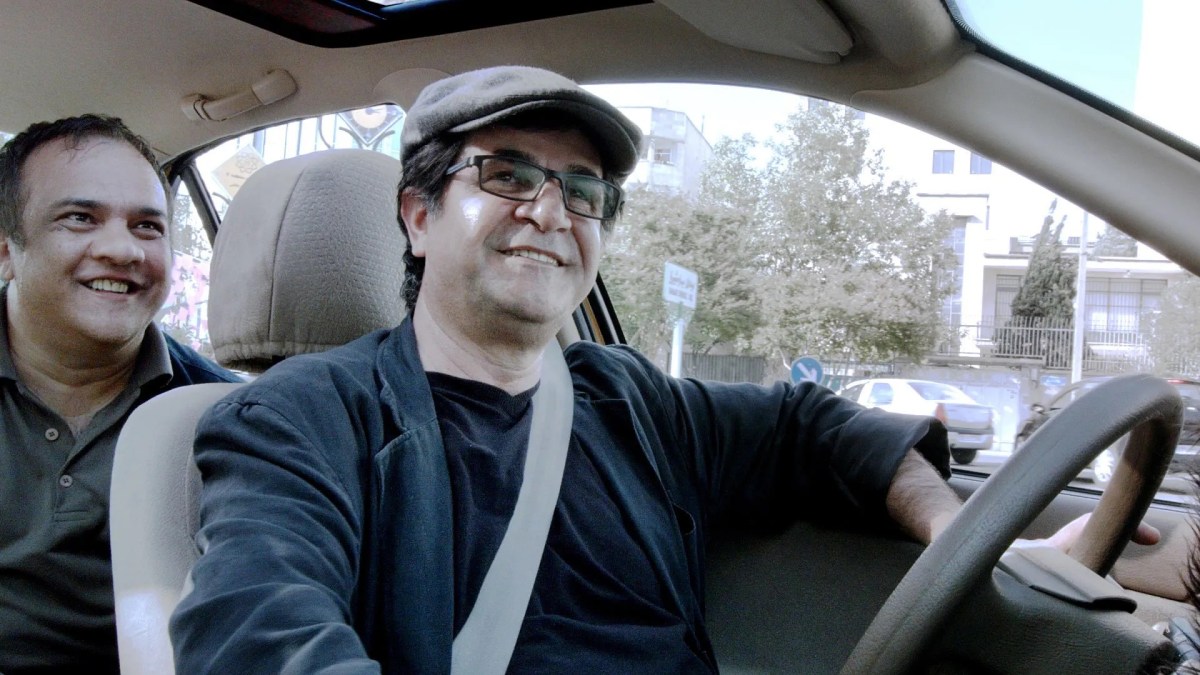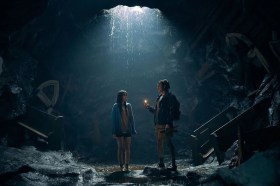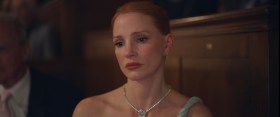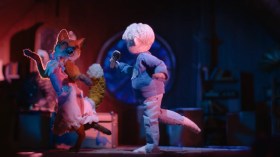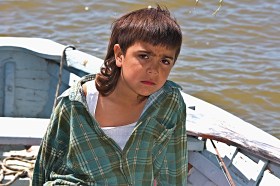Celebrated Iranian filmmaker Jafar Panahi made a surprise appearance at the opening night of Sydney Film Festival (SFF) last night.
The 72nd edition of the festival opened in style at the State Theatre, with a packed Gala screening of Together – the new Australian feature starring Alison Brie, Dave Franco, and Damon Herriman.
Festival Director Nashen Moodley took to the stage to introduce the film’s writer-director Michael Shanks and Herriman, before dropping the surprise announcement about Jafar Panahi and bringing him out on stage.
Panahi, one of the most critically lauded auteurs in world cinema, has spent decades crafting intimate, politically charged stories that challenge the status quo in Iran – many of them made in open defiance of state-imposed filmmaking bans. His latest work, It Was Just an Accident, took out the Palme d’Or at Cannes this year and will have its Australian premiere at SFF as part of the Official Competition.
The festival will also present a full retrospective of Jafar Panahi’s work, with the filmmaker introducing selected screenings and participating in a free public talk at the Festival Hub.
‘Sydney Film Festival has always been about more than just watching films – it’s about creating space to reflect, to be moved, and to be changed,’ said SFF Board Chair Darren Dale in his opening address. ‘This year’s program is one of our boldest and most diverse yet, showcasing voices that challenge, inspire and connect us.’
NSW Minister for the Arts John Graham praised the event as a vital part of Sydney’s cultural calendar: ‘You simply cannot get this experience from your couch.’
Sydney Lord Mayor Clover Moore added that the Festival’s ongoing relevance comes from its ability to continually evolve: ‘It is never the same. The Festival reminds us of the importance of art in reflecting our shared humanity, celebrates difference and reflects the real diversity of our communities.’
The red carpet was also rolled out for a who’s who of Australian screen talent, including Andrea Demetriades, Claudia Karvan, Danny Philippou, Gracie Otto, Hoa Xuande, and Simone Kessell, among others.
Sydney Film Festival 2025 runs from 4–15 June. See the full program at the SFF website.
The Jafar Panahi films to be shown are:
The White Balloon (Badkonake sefid)
Iran | 1995 | 85 mins | In Farsi with English subtitles
A girl’s trip to buy a goldfish becomes an odyssey in Panahi’s Cannes-awarded 1995 directorial debut, which cloaks social critique in the guise of a ‘children’s film’.
Working from a script by his mentor, Abbas Kiarostami (subject of an SFF retrospective in 2021), Panahi transports us to the labyrinthine alleyways of Tehran’s poorer south – where, in a few hours, Nowruz, the Persian New Year celebrations, will begin. Little Razieh has already put on her festive clothes, but she is sulking.
The seven-year-old wants a new goldfish – one that dances, not one of the puny ones from her parents’ pond. Finally given the money by her mother, Razieh runs off eagerly. What seems to be a small quest turns into a documentary-style odyssey, almost incidentally revealing a microcosm of a country rooted in patriarchy, traditional gender concepts, exploitative working conditions and superstition.
The Mirror (Ayneh)
Iran | 1997 | 93 mins | In Farsi with English subtitles
A young girl’s trip home takes a surprising turn. Panahi’s first film to blend fiction with reality – hereafter a signature of his work – won the Golden Leopard at Locarno 1997.
Young Mina is impatient: why hasn’t her mother come to pick her up from school? The little girl – wearing her uniform, one arm in a cast – decides to make her own way home. Her navigation of Tehran’s frightening traffic is captured in raw, documentary-like images: an adventure in miniature.
Along the way, Mina encounters a series of people, most of whom want to help direct her, while others are indifferent to her plight. Suddenly, the child actress protests against her role: she feels trapped in the wrong story. Still miked up, she struggles to get home for real. Just how much of this was staged is unclear – but the ‘mirroring’ of the film’s two halves raises many questions about the nature of both fiction and documentary.
The Circle (Dâyere)
Iran, Italy, Switzerland | 2000 | 91 mins | In Farsi with English subtitles
Interconnected vignettes capture a day in the life of different young women in Tehran as they push back against the restrictions imposed on their sex. Golden Lion, Venice 2000.
In his masterful third feature, Panahi visualises the cruel absurdities women are subjected to in Iran – resulting in the film being banned there. (And yet, the prize it won at Venice is displayed in Tehran’s Cinema Museum: the regime still wants to promote the overseas successes of Iranian cinema.) The heroines of The Circle are poor, and several have just been released from prison (their apparent crimes go unspecified).
Panahi films them with an empathetic gaze, focusing on everyday difficulties: they can’t travel alone, nor check into a hotel; a hijab is not sufficient coverage to enter a hospital.
An emotionally gripping realist work in which oppression is shown to begin at birth, and the fates of all women are linked.
Crimson Gold (Talaye Sorgh)
Iran | 2003 | 97 mins | In Farsi with English subtitles
Inspired by a real event, this neorealist film noir works backwards from a jewel heist gone wrong to expose social inequity in Iran. Un Certain Regard jury prize, Cannes 2003.
In Iran, the men who fought in the Iran–Iraq war are revered as martyrs. But what do their everyday lives look like? Hossein is a pizza delivery man who lives in Tehran’s poorer south. His work takes him to the wealthy north: a foreign, inaccessible world dotted with empty luxury apartments whose owners have fled abroad.
There, a former comrade humiliates him with a huge tip – only reinforcing for Hossein that he’ll never afford the jewellery he wants to get his fiancée. Opening with his irrevocably ill-fated attempt to rob a jewellery store, Crimson Gold is a class-conscious crime drama in reverse.
It’s in Hossein’s cross-city travails leading up to the robbery that Panahi and writer Abbas Kiarostami find the crucial context of his desperate act.
Offside
Iran | 2006 | 93 mins | In Farsi with English subtitles
A football film in which the viewers aren’t allowed to see the match. Nor are the football-mad girls at the heart of this rousing yet comedic Berlin Grand Jury Prize-winner.
1:0, in favour of Iran! But the goal can’t be seen, because the camera is stuck outside the stadium, ‘offside’, along with a group of girls.
In Iran, only men are allowed inside – so the girls dress up as boys. Though they get caught, they refuse to be intimidated. In what becomes a hilarious battle of the sexes, the cheeky, determined girls from the city argue about the ban’s absurdity with the young soldiers from the countryside who have been charged with enforcing it.
Comedy prevails, but beneath the light-hearted surface, injustice simmers. Inspired by an experience he shared with his daughter, football fan Panahi shot much of Offside outside a roaring stadium during a real game.
This Is Not a Film (In film nist)
Iran | 2011 | 75 mins | In Farsi with English subtitles
A defiant but ever-witty Panahi, recently banned from filmmaking, sets out to redefine the concept of the ‘home movie’. A radical and passionate gesture of faith in cinema.
Tehran, during the 2011 Iranian New Year. Panahi sits in his apartment, eating, watching the news, waiting to hear from his lawyer – who has filed an appeal against the government’s 20-year ban on his filmmaking.
He’s tired of this involuntary inactivity. Bored, he begins to document his everyday life – reaching for his camera as an act of resistance. When his friend and colleague, the renowned documentarian Mojtaba Mirtahmasb, drops by, the pair discuss the precarious status of cinema in Iran. Then Panahi begins to move the furniture and mark the floor up with packing tape.
He introduces a scene from a script the censorship authorities rejected: with a bit of imagination, we see a film that should not exist take shape.
Closed Curtain (Pardé)
Iran | 2013 | 106 mins | In Farsi with English subtitles
Panahi’s second film made under his ‘ban’ melds a fugitive tale with his own fight against melancholy and the regime that would silence him. Silver Bear for Best Script, Berlinale 2013.
An uneasy alliance forms between two people on the run: a young woman who went to an illicit beach party, and a screenwriter with a dog – deemed unclean by Islamic law, and so forbidden. The pair (played by co-director Kambozia Partovi, also writer of The Circle, and My Favourite Cake’s Maryam Moghaddam) barricade themselves in a secluded villa with curtained windows on the shores of the Caspian Sea.
But are they outlaws, or merely phantoms – figments conjured by a filmmaker no longer allowed to work? Then Jafar Panahi himself enters the scene and the curtains are literally, figuratively pulled open – or so it seems.
In this twisty chamber piece, reality and fiction refuse to fully disentangle.
Tehran Taxi
Iran | 2015 | 82 mins | In Farsi with English subtitles
In this daring work of guerilla filmmaking, Panahi takes viewers on a comedic but revealing taxi ride through contemporary Tehran. Golden Bear winner, Berlinale 2015.
A yellow cab moves through the Iranian capital’s vibrant streets, picking up an array of passengers: a blackmarket DVD dealer; a human rights lawyer; two stubborn old ladies.
Each party speaks candidly about social issues, as prompted by the driver – who is none other than Panahi himself, banned from his profession and yet still shooting. With a camera on the dashboard, he creates a mobile studio from which to capture the spirit of present-day Iran.
Filmmaking itself becomes a topic when Panahi’s clever niece gets into the car: she’s in the process of making a movie herself, and – pointedly – has been instructed by her teacher to avoid ‘sordid realism’.
A stand-out in the Iranian road movie tradition.
3 Faces (Se rokh)
Iran | 2018 | 100 mins | In Farsi and Azerbaijani with English subtitles
Panahi and actress Behnaz Jafari play themselves on an urgent, meta-fictional road trip that reveals the divide between rural and urban Iran. Best Screenplay, Cannes 2018.
Behnaz, a prominent Iranian actress, is distraught when she receives a video-recorded plea from a suicidal young woman whose family have prohibited her from studying acting – in traditional communities, still considered an unseemly and immoral profession for women.
Behnaz seeks out her old friend Jafar, and together they travel to the rural northwest (where Panahi’s own parents hail from) in search of the girl.
Along the way, the two city dwellers meet friendly and talkative but also very traditional locals, who ground the story in reality with their special linguistic poetry while also steering it towards comedy. Nevertheless, the film never shies away from the fact that this world has no place for a headstrong girl.
No Bears (Kherz nist)
Iran | 2022 | 107 mins | In Farsi, Azerbaijani and Turkish with English subtitles
This courageous and sophisticated meta-fiction reflects on art, creativity, and borders that can’t be crossed, both geographical and mental. Special Jury Prize, Venice 2022.
‘Cut!’ A director banned from working or leaving Iran is nevertheless in the process of making a new film, remotely, via video – about a couple who want to emigrate from Turkey to the West. The director is of course Jafar Panahi, again playing a fictionalised version of himself and making ingenious use of highly restricted circumstances.
While his crew works on-site in a Turkish border town, Jafar explores the Iranian village just across the border where he’s staying, camera in hand. When he’s accused of taking an incriminating photo, he finds himself enmeshed in a local drama. In the fifth and perhaps most subversive film he’s made under his ban, Panahi questions the role of the artist in a society all too willing to scapegoat them. Watch the trailer.
